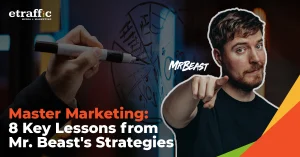![]() Posted by Cameron Francis
on
11 Sep , 2018
in
News Uncategorized
Posted by Cameron Francis
on
11 Sep , 2018
in
News Uncategorized


When it comes to Search Engine Optimisation (SEO), there is so much conflicting information that is given these days.
This includes many myths about SEO that actually aren’t true at all. It can be a real minefield trying to figure out what is real and what isn’t.
Or what SEO strategies are effective and safe and which one+s aren’t.
Google’s “Rank Brain” AI algorithm is continually evolving, which means that SEO has to evolve along with it. Not only is it important to know what to do, but it is also critical to know what not to do.
You need to be aware of what some of the more common SEO myths are so that you don’t use unsafe or ineffective SEO methods.
This is true whether your do your own SEO or have an SEO Company do the work for you. Either way, it is very important that you stay informed so that your company can use SEO effectively to meet your business goals.
I will be discussing some of the more common SEO myths. They cover all of the major components, including On-Page SEO Myths, Off-Page SEO Myths, as well as myths about content and some other fallacies that you should be aware of.
My goal here is to ensure that you are informed on not only many of the major myths surrounding SEO, but also what some of the best practices and strategies are so that you can get your website ranked higher on Google.
On-Page SEO Myths
In the past, SEO often focused on keyword stuffing and other questionable tactics to try to manipulate the search rankings. With the introduction of Panda, Penguin and other search algorithm changes, these tactics are no longer effective. Here are several common on-page SEO myths that you need to be aware of.
1. H1 Tags Are An Important On-Page Ranking Factor
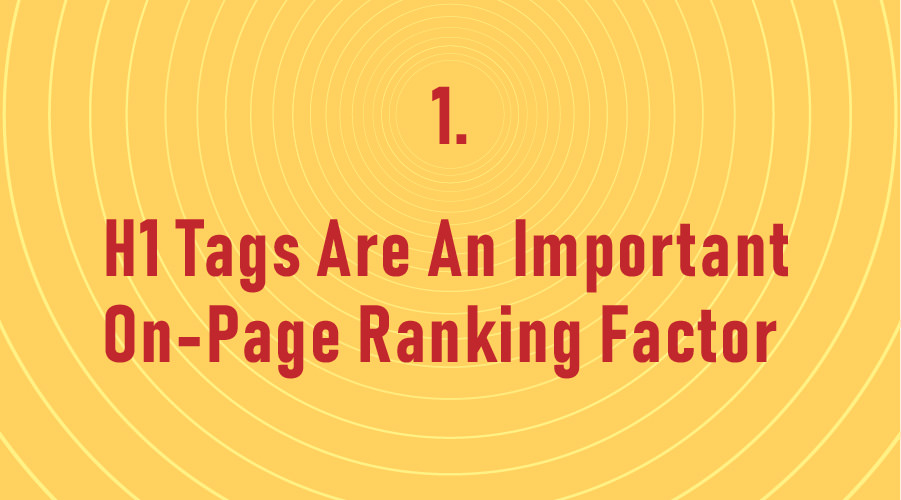
Before Google started releasing its Panda updates, on-page optimisation efforts carried much more weight with the search engines. However, things have changed. Although H1 tags are still important, there is no clear evidence that they can directly help to increase the search rankings of your webpages.
The most important factor in achieving high rankings is for your webpages to contain useful and relevant information that addresses the needs and concerns of your readers. The specific header tags that are used are not the key factor in helping your website rank.
One of the main reasons why this myth may be so prevalent is because it is easy to implement on-page elements like header tags. However, that doesn’t mean they will necessarily increase your rankings. Many people are still looking for easy solutions to ranking, but there is no such thing as an easy fix.
This doesn’t mean that header tags are useless or should not be used in your content. Header tags can be a very useful way to organise and break up information on your web pages. Using headings and subheadings can help to organise your content and make it more understandable for your readers.
Therefore, using header tags for the reader’s convenience is a good reason to use such tags as the H1 and H2 tags. Creating a better user experience for your readers should be your focus and tags can definitely help with this.
If your content is easy to understand and digest, readers may also stick around on your site longer and read more content. These actions send good signals to the search engines and can help to bring more targeted traffic to your website through increasing your site’s search rankings.
So although using H1 tags does not directly increase your search rankings, using them effectively to help organise your content can definitely help you gain favorability with the search engines.
2. Meta Descriptions Are Not Important
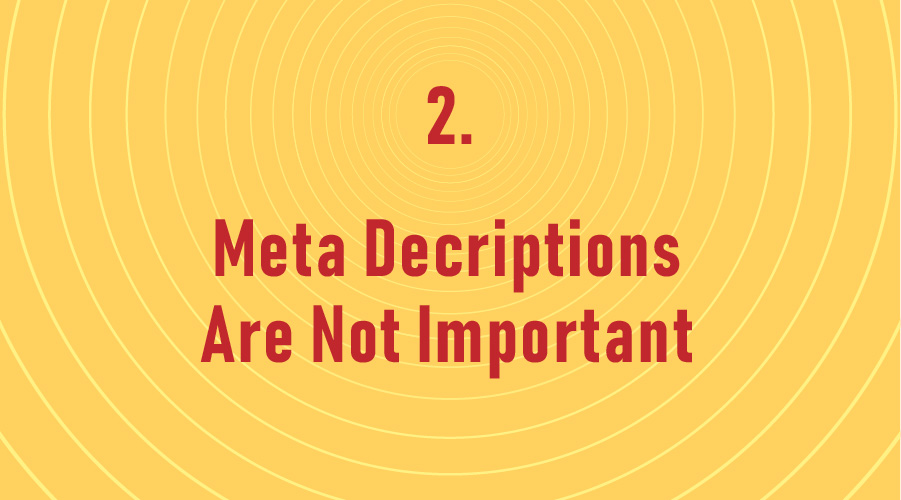
Google has stated that meta descriptions are not a ranking factor in their search algorithms. However, that does not mean they are unimportant and that you can afford to ignore them.
A meta tag is one of the HTML tags that is part of the <head> tag of a web page. It contains a meta description which is often used as a preview snippet in Google and other search engine results for a specific webpage. An effective meta description provides a concise explanation of what a web page is all about and compels a searcher to want to click on the web page link to learn more.
The meta description is optional and does not have to be used. However, by believing the SEO myth that meta descriptions are unimportant, you forfeit your chance to create an effective preview snippet that may be used in the search results to describe your webpage. If you leave the meta descriptions blank in the HTML code, Google and the other search engines will either have to come up with their own snippet to describe your page or leave it blank.
Your meta description helps to tell the search engines and searchers what your web pages are about. The critical point here is that an effective meta description can increase clickthroughs to your webpages and bring more targeted traffic to your website.
So although the meta description may not directly affect where your webpages are displayed in the search results, increasing clickthroughs to your webpages is a critical component of SEO. It is not enough for your pages to simply show up in the search results. Users need to be motivated to click through to your site in order for your SEO to be effective.
Here are some tips to help you create effective meta descriptions:
Make sure they are descriptive. Your most important keywords should be used and you should succinctly describe what the page is about and how it meets the searcher’s needs.
Make your meta descriptions unique. Each web page should have a unique meta description.
Make them succinct. Meta descriptions are limited to 160 or fewer characters in Google.
3. It isn’t important to optimise your images for SEO purposes.
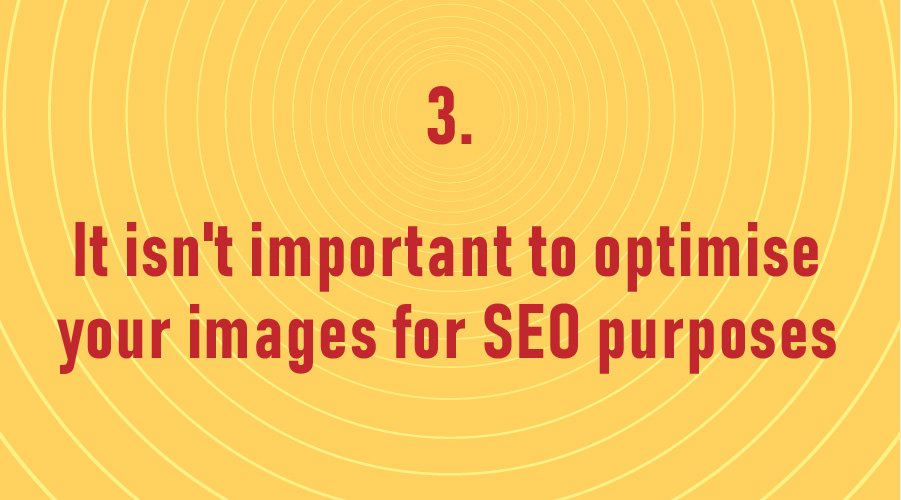
In the past, it really didn’t matter a great deal if you didn’t spend a lot of time optimising the images on your website. You could still rank well without using image filenames and alt text to boost the relevance of your webpages. However, these days it is very important to optimise your images as part of your overall on-page SEO strategy to help provide a boost to your rankings.
Many people are not aware that search engines are actually not able to see images. They are robots that crawl text, but they are unable to recognise images. Therefore it is very important that you give your images relevant filenames and alt text so that Google knows what your images are all about. Not adding alt text and file names using targeted keywords that relate to your image is a huge lost opportunity. It is definitely worth the time to optimise your images so that the search engines know what they are.
It also helps if the text on the webpage where the image is refers to the image. So try to make references to your images within the text, near where they are located, wherever this is appropriate. Use keywords that are similar to the filename and alt text of the image. Another thing that Google recommends is that your images should have descriptive captions and titles. So when these are relevant, you should definitely consider adding them.
The images types that Google is able to index include SVG, WebP, PNG, JPEG, GIF and BMP, so make sure to use only those image file types when adding images to your webpages to ensure that Google is able to index them.
It is very important to use targeted keywords in your image filenames and alt text so that search engines not only know what your image is but also help provide more relevance to your webpage. Optimising your images is definitely something you should include as part of your on-page SEO efforts to help give your search rankings a boost.
4. The visitors experience on the site is not a ranking factor and only affects website conversions!
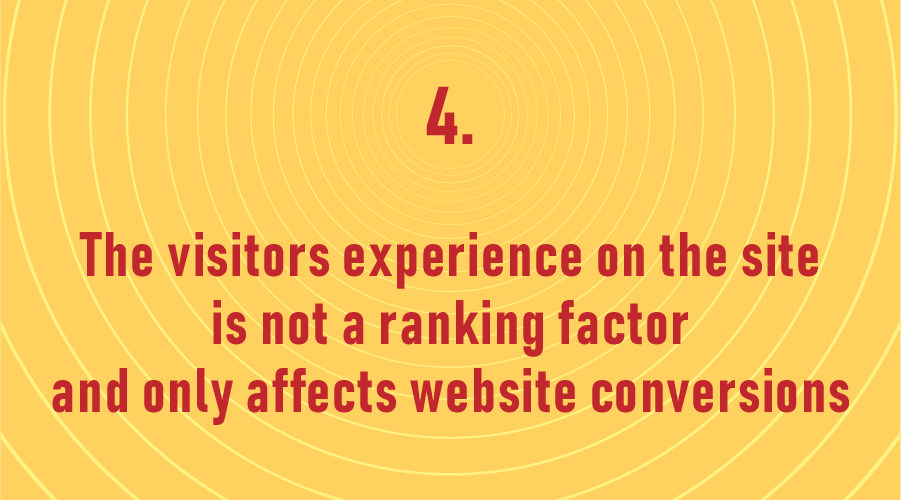
In the past, many SEO experts did not pay too much attention to user experience. Optimisation efforts mostly focused on satisfying the search engines instead of the users. However, over time Google has refined their search algorithms to the point that good user experience has become essential if you want to rank high in the search results. Google has gotten better at being able to assess ranking signals for user effectiveness and now factor these signals into their search algorithms.
When Google sends a visitor to your webpage, they want the person to have a positive user experience so that they will continue to use their search engine. When users have a poor experience, they may not trust the search engine results any longer and decide not to use it. After all, the search engine is basically recommending your webpage when it sends a visitor to your site. It is telling the searcher that he or she can find useful and relevant information that relates to their search query.
In order to improve the user experience of visitors to your website, some of the most important things that you will want to focus on include bounce rate, page load times, time spent on your pages, how many pages are viewed per visit, how far down people scroll your pages and your navigation. Your website should load quickly, contain useful information and be easy to navigate. These are all things that will help to make the user experience a positive one for your site visitors.
Your number one goal should be to create high quality content that provides your readers with useful information that is easy to read and understand. It should contain your targeted keywords, along with related keywords and content that is relevant to the search query that the visitor typed into the search engine.
Today it is more important than ever to focus on user experience and not just strictly try to optimise for the search engines. When you have a useful site that is easy to use and navigate, the search engines will reward you with higher rankings. Focus on your visitors and providing them with an easy to use website that contains useful information. Good user experience is definitely a necessity these days and not just an added bonus.
5. Linking out to authority websites will drive visitors away from your site
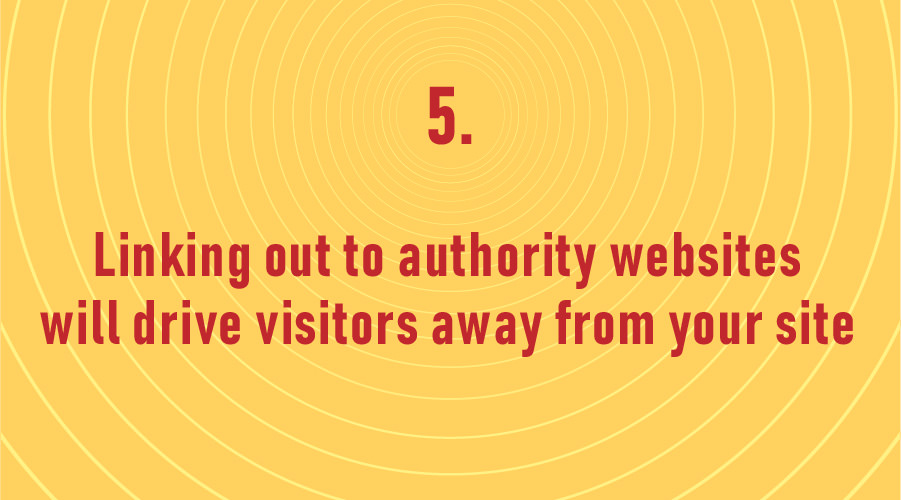
Many webmasters are hesitant to include links to authority websites in their industry or niche because they are afraid they will drive visitors away from their own site. However, linking to relevant authority websites can be a very effective SEO link building strategy.
Google look favourably on websites that provide useful information and resources to their audience. Readers also appreciate websites that provide helpful information and are more likely to return to sites that provide them with a lot of value, good resources and information. So linking out to other useful sites can definitely be very beneficial for your website.
Your readers may click over to other sites, but they will return to yours as well. This is especially true if they consider your website to be a valuable resource of information. Another thing that you can do is have the links to outgoing websites open in a new tab. That way your visitors stay on your website while still having access to resources on another site at the same time.
Linking out to authority sites can also help the search engines find and index your webpages, especially when your content is closely related to the authority site. Google and the other search engines will crawl your site and follow the links that you have provided to trusted authority websites.
The key is to make sure you only link out to quality sites that provide your readers with relevant and useful information. Linking out to quality, authority sites provide your website with a boost in the search rankings.
Here are some useful tips you can follow when linking out to authority websites, to help you stay safe and get the most benefit from this effort:
– Link out only when there is a specific purpose for doing so, such as providing additional useful information from an authority source.
– Link out from pages that have high-quality content posted on them.
– The anchor text that you use to link out with should either be the authority site’s URL or brand name.
– Link to specific inner pages on an authority site that directly relate to your content and not just the home page of the site.
– Notify the owner of the sites you are linking out to. They might provide you with a link back, a tweet or some other type of mention that can benefit your business and website.
SEO Myths About Content
The content on your website is part of your on-site SEO, however, we have separated these out because of how important content is to your SEO result. It is very important to be aware of the following SEO myths about content in order to focus on the most effective strategies of adding quality content to your website.
6. Keyword Targeting Is No Longer Relevant For SEO
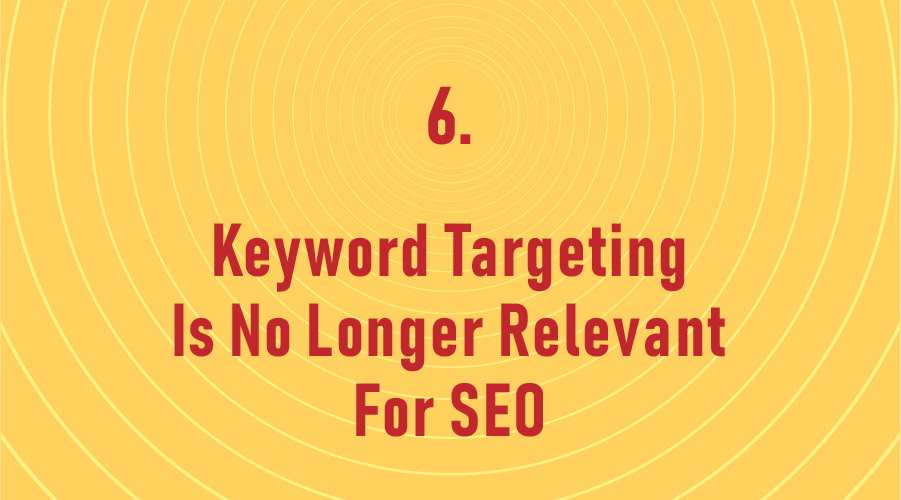
Ever since Google introduced the Hummingbird update in the fall of 2013, many people have made the mistake in thinking that targeting keywords was no longer effective or necessary for ranking their websites.
However, that is is one of the biggest SEO myths of all.
In fact, in some ways targeting keywords is more important than ever. Hummingbird introduced the concept of semantic search. It is critical now to ensure that your content not only contains your targeted keywords but also provides information that is relevant to the searcher’s query. The content should contain synonyms and related keywords to make the information more relevant and useful to the searcher. It is not simply enough these days to stuff pages with your targeted keywords to rank for them.
That does not mean that keyword targeting is no longer important. It means the content you publish must not only include the keywords you are trying to rank for but also must offer real value to searchers. So you must have a deeper understanding of the keywords you are trying to rank for as well as what your potential website visitors are searching for.
An effective keyword strategy is still necessary, and in fact keyword targeting and research has become easier in some ways. Instead of having to worry about certain keyword density, you can now focus on what the searcher’s intent is and provide the information that they are searching for.
For example, if someone is looking for “keyword research tool” the query still has to start with a keyword phrase. For anyone wanting to rank for this keyword phrase, it will be necessary for them to provide relevant information that answers this question. It will also need to include other related keywords and concepts. Therefore, it is important to know what kind of information searchers are actually looking for when typing this phrase into the search box.
The main difference now is that it is essential to understand why people are typing certain keywords and keyword phrases into a search engine. You must create relevant content that answers the query. This is achieved through using other related keywords and concepts in addition to your target keywords. So it is more important to understand both searcher intent and the meaning behind the keywords you are targeting than it was in the past.
Keywords are still used by not only search engines but also other authority platforms like YouTube, Facebook, Twitter and shopping sites like Amazon.
Therefore, keyword targeting is still very much alive and important to any organisation’s SEO efforts.
It is nearly impossible to find what you are looking for unless you use keywords in your queries. Therefore, keyword targeting will always be a critical aspect in search engine optimisation. Targeting keywords has become a much more sophisticated concept but is still absolutely essential to any SEO effort. Ignoring keyword research and targeting keywords is a huge mistake.
Don’t let this SEO myth fool you!
7. Google Will Automatically Find And Index New Content On Your Website
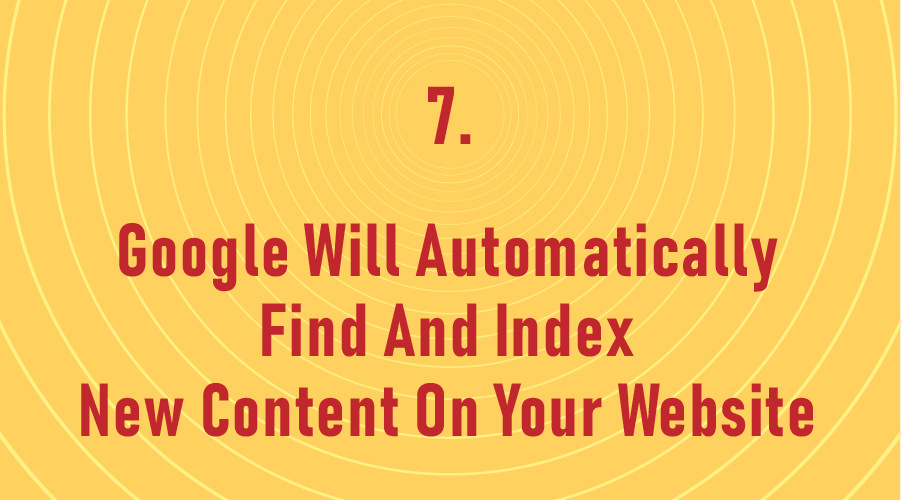
Build it and they will come? Although Google and the other search engines might eventually find, crawl and index the new content on your website, there are things you can and should do to make this process occur faster and easier. You should never just assume that the search engines are going to automatically find your new content and new webpages.
This is especially important if you have a new website or blog. It can take longer for the search engine spiders to discover your new content when your site is not very well established yet.
One thing you can do if you are running WordPress on your website or blog is to install the Google XML sitemap generator plugin. Once the plugin is installed, every time you publish a new piece of content, a new XML sitemap is generated and is sent to all of the major search engines to inform them of your new content. This helps the search engines index new content quickly.
Sharing your content on social sites is another good way to get new content indexed quickly. That is because these sites are already crawled by the search engines on a regular basis. So if they find links to content posted on your website or blog, they will follow the link and find the original content to crawl and index.
The best way to have your new content found quickly by the search engines is to publish on a regular basis and continue to work on your SEO to establish authority and trust. It is a long-term process but definitely well worth the effort.
8. The More Pages My Website Has, The Better It Is For My Rankings
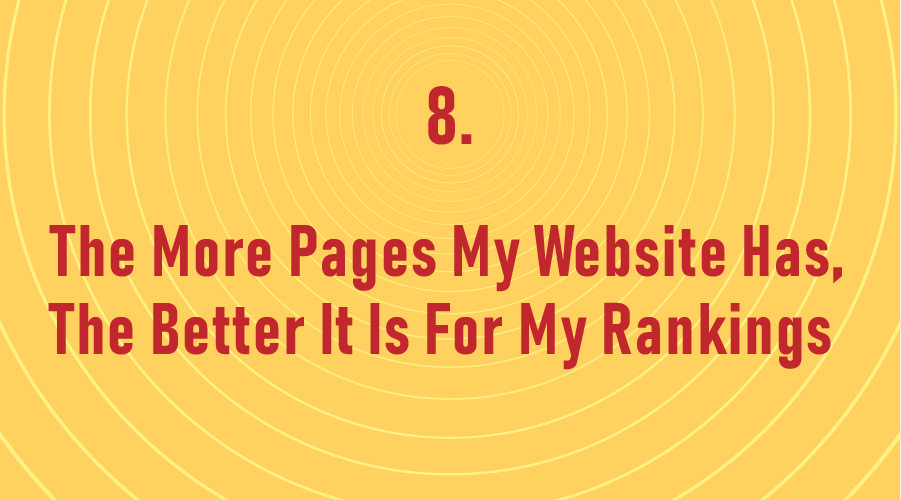
Some people think that the more pages their website has, the better their rankings will be. However, simply having more pages on your site will not guarantee high search rankings, just like having more links doesn’t. The emphasis has to be on quality these days, not quantity.
In fact, having a lot of low quality on your website could actually do more harm than good. It is very important to focus on publishing high quality, unique content on your website these days.
In the past, many focused their SEO efforts on manipulating keywords and optimising their pages in order to manipulate the search engine rankings. However, these types of tactics are no longer effective.
Google’s Panda algorithm, which was first introduced in 2011, focused on quality of webpages. It has continued to get better at being able to detect low quality content that isn’t helpful to visitors. Having poor quality content on your website these days can result in your site being penalised by Google and other search engines.
Another thing to keep in mind is that simply publishing a high number of pages doesn’t even guarantee that they will get indexed, let alone help your website rank higher. This is especially true if the content if of low quality and is not unique to other content being published on the web. Also, some pages that do get indexed, don’t always stay indexed. Finally, not all indexed pages will automatically drive qualified traffic to your website that results in an increased number of leads and sales for your business.
Trying to publish a high number of pages can often lead to sacrifices in quality even when that is not the intent. It is much better to focus on quality than quantity, although if you can do both that is even better. It is true that the more quality, useful content that you have on your site, the better your chances are of bringing in more qualified traffic to your website. However, just make sure to only publish content that is relevant to your website and that is useful to your visitors. Don’t use publish to simply add more pages to your website. That will not help with your ranking efforts and could actually be harmful.
Off-Page SEO Myths
There are so many off-page SEO myths going around these days. Many website owners are either afraid to try to acquire backlinks or do so ineffectively. A lot has changed over the past several years when it comes to off-page SEO. That is why it is critical to be aware of what some of the major myths are so that your off-page SEO efforts can be effective and help to increase your rankings.
9. Using a target keyword for your anchor text is no longer important for SEO.
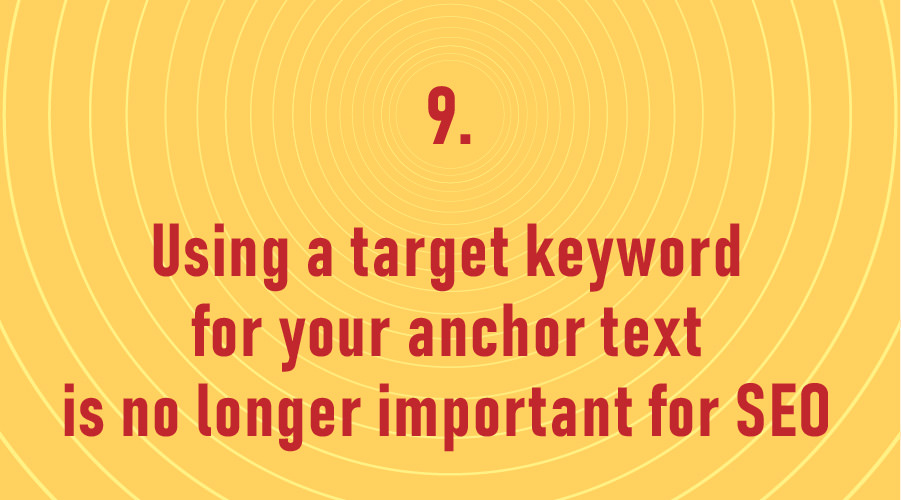
The question here is, should keywords be used in your anchor text when building backlinks?
Anchor text refers to the clickable text in the link that is clicked on to take the reader to your website. Many SEO experts think that anchor text will always be a ranking factor, no matter what specific changes are made in future Google updates.
So does using targeted keywords in your anchor text still help to boost your rankings?
The goal of every change or update to search algorithms is to help searchers find the best webpages that provide the best information on whatever topic they are searching for, in a user-friendly way.
You do risk being penalised by Google if you over optimise your anchor text. Prior to Google Penguin, keyword anchor text could be heavily used for both external as well as internal linking. However, these days using keyword-rich anchor text too excessively can negatively affect your website and get it penalised with the search engines. Cross-linking using keyword-rich anchor text is also risky, so you should avoid using it.
However, it is still a big SEO myth to say that keyword-rich anchor text is not relevant any longer to search engine rankings. Times are different, so you do need to change your approach. The key is to diversify your anchor text to ensure that you use both main and secondary keywords, your brand name, your URL, generic keywords (i.e. click here) and meta keyword phrases as anchor text.
In other words, you need to use a mix of different keywords as your anchor text and not use the same few targeted keywords over and over again. That is what can cause your website to be adversely affected or even penalised by the search engines.
Building natural links is the safest way to go. The best way to do that is to focus on creating high-quality content that authority sites will want to link to on their own as valuable resources. That will help you avoid getting penalised by the search engines.
After Google released its first Penguin update, a majority of websites with excessively optimised anchor text were penalised. However, most websites with diversified anchor text enjoyed a boost in the rankings.
There are three different anchors of anchors text to focus your SEO strategy and content marketing around:
(1). Natural anchor text: This should be URL, brand or keyword-rich anchor text. However, it should naturally flow within the content. Mainly these are editorial links that can definitely positively impact your rankings. They are links that point to internal pages that has content that directly relates to the anchor text.
(2). Brand URL or brand name anchor text. This is the safest type of anchor text to use and can also be very effective for building your brand as well as for SEO purposes. With this strategy, you want to aim to use branded anchor text around 90% of the time.
So, for example, if you are using guest blogging as part of your SEO strategy, use brand anchor text in your content and author bio box.
(3). Generic anchor text. This involves using generic phrases like “click here” as your anchor text. You don’t want to use this too excessively, because it doesn’t help to promote your content or brand. Also, if used excessively, it too could end up being considered as over optimised. However, around 5% of your anchor text should be generic to add to the mix.
The bottom line here is that targeted keyword anchor text is important still, but you need to diversify and be smart about how you use it.
10. Having More Links To My Website Is Better Than Having More Content
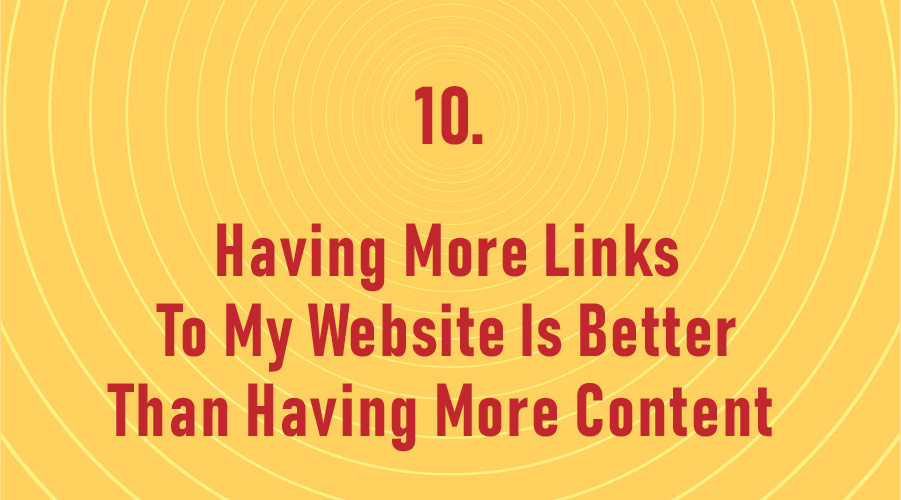
In the past, the emphasis of SEO was much more focused on building as many backlinks as possible. Not a lot of analysis went into the quality of the linking domains. The priority was on quantity over quality of links. This was an effective strategy for getting your website to rank higher, especially when combined with using a heavy dose of keyword-rich anchor text.
These days, building backlinks to your website is still a very important factor in getting high rankings. However, quality of links is much more important than quantity. Also, getting links in high numbers can be a dangerous strategy that can result in your website being penalised by the search engines.
It is also not a question of either backlinks or content. You need quality content and quality links to rank high in the search engines these days. In other words, you need both. So you need to allocate part of your overall budget to content creation and part of it to obtaining high quality, relevant links to your website. The links should come from diverse sources and the focus should be on quality and relevancy and not quantity of links.
When investing in content, it can be used not only for the webpages on your site, but also for guest posts on other blogs and websites, for lead generation offers and more. Content also goes beyond just articles and blog posts. It can include videos, infographics, images and much more. When creating content, just like with your backlinking efforts, the focus should be on quality and not quantity. Create content that will be useful and helpful to your readers.
11. Guest Blogging Doesn’t Work Anymore
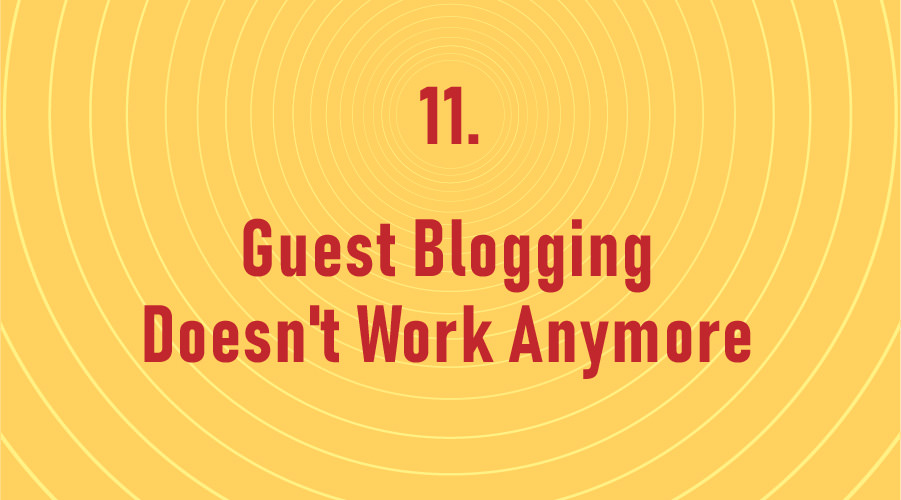
At one point Matt Cutts from Google made a statement that guest blogging shouldn’t be used as a way to get links. Many so-called experts misunderstood what he meant and started to advise people not to use guest blogging anymore for obtaining backlinks for their websites.
So does that mean that guest blogging is no longer effective for SEO purposes? Absolutely not.
Guest blogging is the same as any other content. If just means that the piece of content was written by someone other than the owner of the site. So you can both accept guest bloggers to contribute to your site and you can contribute to other sites to get a backlink to your website.
Matt Cutts was referring to low quality content posted on sites just for the sake of a backlink. Many content farms have been set up in the past strictly for the sake of posting content with links. He was not referring to high quality content posted on quality sites that relate to your website or business. The key to successful guest blogging is to publish high quality content on quality websites and blogs that have strong link profiles.
Billions of web pages are indexed by the search engines, coming from various locations, IP addresses, domain names, etc. Different people own these webpages. There is a huge amount of inter-connectivity involved. That is what the world wide web is for after all.
Content published on high authority website such as the New York Times, CNN, Business Week and more have regular contributions from outside authors and freelancers every day! There is no way the search engines are going to penalise guest blogging, and in fact there is no real way to do so. What they can penalise or ignore is low quality content published on low quality sites.
The context is what is key here: it is the kind of article, the uniqueness of the content, the links pointing from and to the site, and anchor text that are used. There is no way guest posting is every going to die, since there is no way to accurately determine what a guest post actually is and so much high quality content is published using this technique.
Guest blogging can be a very effective form of SEO to help boost your rankings. Follow these basic tips for the best results:
– Avoid spammy, low quality sites. Don’t contribute to any blog or website that doesn’t post unique content.
– Don’t refer to posts on your website as “guest posts.” Just treat them the way you would in-house contributors. As long as you are posting relevant and useful content on your website, it really doesn’t matter who the contributor is.
– Focus on building relationships instead of just building links. In the long run, this will help to build your brand and expertise as well as bring more traffic to your site.
– Focus on building your brand. Use natural linking by using your URL or brand name as the anchor text for most of your guest blogging contributions.
– Focus on getting contextual links as much as you can. Try to build links that are contained within the content instead of the author box or profile, since these links carry more weight.
– Be careful about how you use guest blogging. Create high-quality content and focus on the readers. Provide them with useful content that helps to solve their problems. Reply to comments and engage with readers.
Guest blogging can be a very effective way to increase your rankings and drive targeted traffic to your site. It is also a very useful way to build relationships with others in your industry as well as potential customers. It is far from being dead or ineffective.
Other SEO Myths
Finally, here are a few important SEO myths for you to be aware of. It is critical to focus on what is important and to understand just how valuable SEO can be for your business.
12. To rank well in the search engines it is not necessary to have a secure (HTTPS encrypted) website.
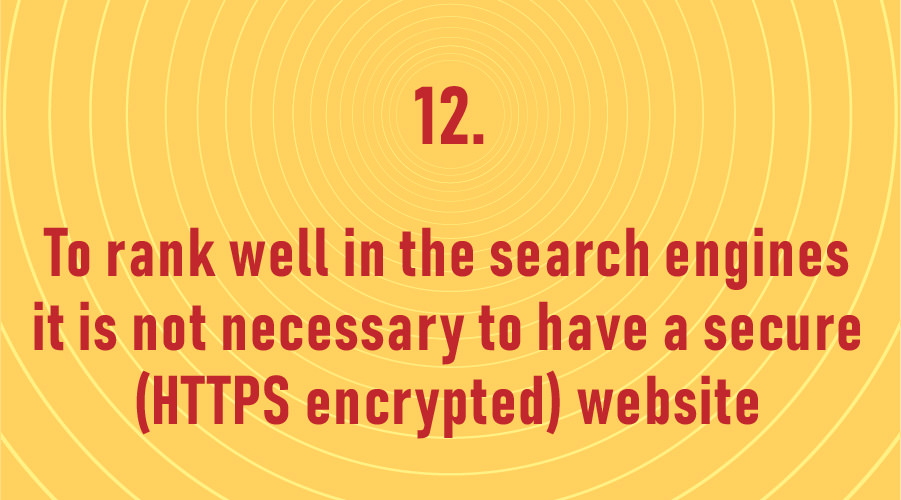
You might have noticed that some website URLs begin with https:// instead of the more common http://. You might also have heard that you should never provide any sensitive data such as your credit card information unless you see https in your browser. That extra “s” means that the connection to the website is encrypted, which prevents hackers from being able to intercept your data. Secure Sockets Layer (SSL) is the specific technology that is used for encrypting data over the internet.
SSL has emerged as the standard security technology that is utilized for establishing an encrypted link between a browser and web server. That link helps to ensure that all of the data being passed between a browser and web server stays private.
Having SSL is critical on an ecommerce website to ensure that customer’s information is kept private. However, it is becoming increasingly important for all websites to use SSL and not just ecommerce sites and other websites where users are inputting their private information.
Google announced in 2014 that it had started to use HTTP as one of the signals in the search engine’s ranking algorithms. As a result, if your website is still relying on standard HTTP instead of HTTPS, you rankings might be negatively impacted.
Until recently, HTTPS was still a very weak signal for the ranking algorithms. According to Google it affected less than 1% of global queries. So most website owners were still not paying a lot of attention to it. However, then Google made an announcement in September 2016 that Chrome would start flagging HTTP pages as being potentially unsafe beginning in January 2017. It is part of Google’s long-term plan to label all HTTP websites as non-secure. So now is the time to get started on encrypting your website if you haven’t done so already.
Some hosting services will provide standard SSL certifications free of charge for some of their hosting plans. Or you can usually purchase it for an extra fee from your hosting company. If you forego this security measure, your website might be marked as unsafe by Google and your rankings could be negatively impacted by this as well.
13. When It Comes To SEO, Top Rankings Are Everything
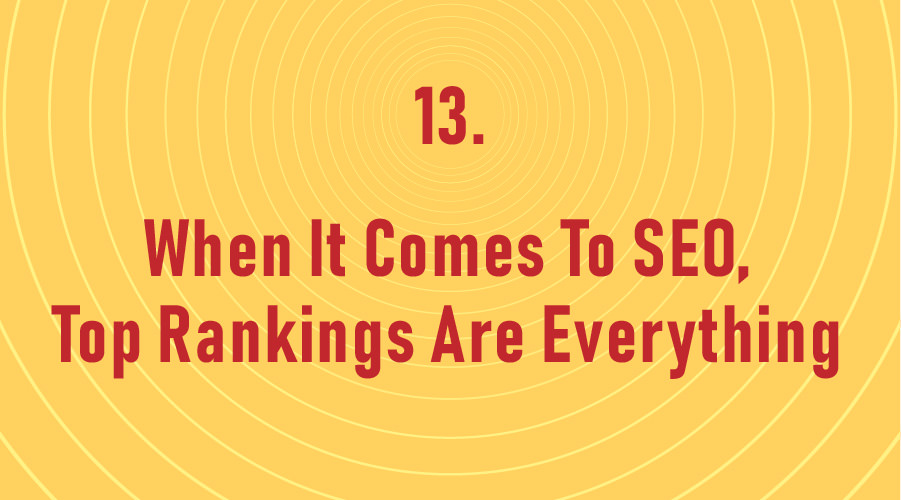
Although there is a very strong correlation between clickthrough rates and search results position, ranking is not everything. There have been studies of user behaviour and clickthrough rates that show that the top search results are favoured by searchers – especially the top three results. However, similar click behaviour has been shown for subsequent pages, where the top results on the page are favoured. Also, now that the search results contain rich text snippets, the search results appearing under the top three spots are obtaining much higher clickthrough rates than they used to.
High rankings alone do not guarantee success. You still need high clickthrough and conversion rates in order for the high rankings to translate into anything valuable and profitable for your business. Although higher rankings gives you a better chance to get more organic traffic to your website, it is not guaranteed. There are a few reasons why this might happen:
(1). You are attempting to rank for keywords that are not relevant or related to your business and industry. It is critical to conduct careful keyword research and choose keywords to target in your SEO efforts that relate to your business and that will convert at high rates. This could be either to make sales, build your email list or some other objective.
(2). The user does not find your meta descriptions to be inviting or appealing. This goes back to one of our earlier SEO myths about meta descriptions not being important. It is critical to have enticing meta descriptions to get high clickthroughs to your website. Again, having high rankings does not by itself guarantee tons of traffic.
(3). The top result might not be an organic listing. There could be product listing ads stealing clicks away from organic research results. One way to combat this problem is to consider supplementing your organic SEO work with paid search advertising on mobile-oriented queries.
(4). The top result might be a Featured Snippet, that can definitely get more clicks than the top organic listing. Make sure to have well structured content
and appealing meta descriptions to help combat this issue.
Ranking is not useful for just for ranking sake. It is also important to have effective meta descriptions and to continue to work on improving conversions on your website. Ranking is very important but it needs to be measured and used in the context of your overall sales and SEO strategy.
14. Hiring A Good SEO Firm Guarantees Top Rankings Fast
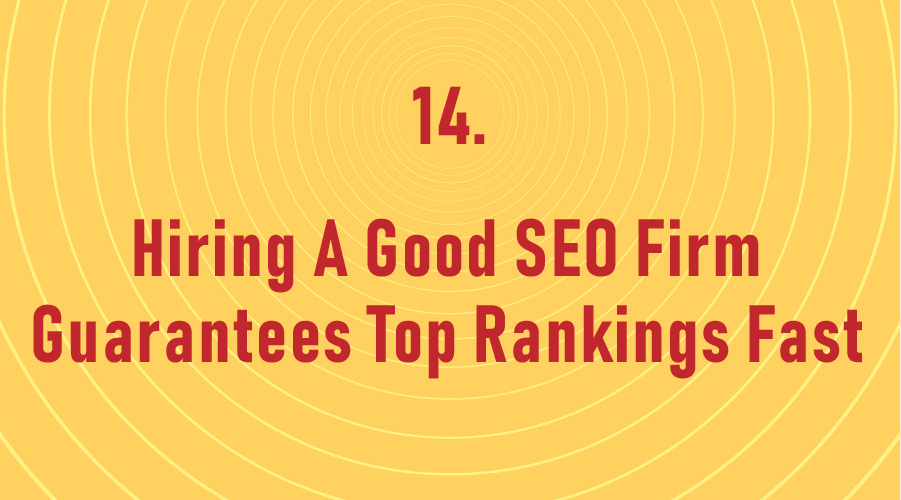
Any SEO firm that guarantees fast rankings, or any rankings for that matter, should be avoided. There is no such thing as a guarantee and sound SEO practices take time to achieve top rankings.
There are a number of good reasons why you may want to hire an SEO firm. They include expert competitive auditing and keyword analysis to help with your content marketing, along with analysing and adjusting your metrics. However, ranking quickly is not a good reason to hire an SEO firm.
There are more than 100 billion searches conducted on Google alone. No SEO firm or expert can predict what keywords will be used tomorrow, and it is impossible for anybody to guarantee quick search rankings. Any firm that does is not reputable and should be avoided.
There are many different factors that can impact your search engine rankings. Also, the algorithms are constantly being tweaked and changed. So the most important thing is to find a reputable SEO firm that takes a long-term approach to search engine optimisation.
It is important to find an SEO expert with plenty of experience and knowledge.
Guaranteeing fast results a sign of a dishonest amateur and not a professional expert.
If you are looking for fast results, then you are better off to invest in paid advertising. However, that can get expensive. For organic traffic, you need to be patient and take a long term approach.
In-depth content, authority links and aged domains can all help to increase your rankings. However, even these things will not guarantee results.
It is a good idea to hire an SEO firm if you have the funds to do so. After all, they specialise in search engine optimisation. They can help you with things such as content marketing, link profile and backlinking campaigns, keyword research and more.
The following are some good reasons why you might want to hire an SEO expert:
– You don’t have enough time to do your own SEO and optimise your website.
– You want to increase the amount of search traffic to your website.
– You need assistance with keyword research, especially finding relevant and effective long-tail keywords to target.
– You want to stay current on best SEO practices.
– You want an SEO firm to train you and your staff.
These are all solid reasons for hiring an SEO firm. SEO experts can definitely be very helpful in helping you increase your rankings.
Just don’t ever hire an SEO firm that guarantees top rankings quickly. If they do succeed at getting your website to the No. 1 position quickly, it will most likely be very short-lived. Your site will probably end up sliding back down in the rankings just as faster or faster than it went up, and you could very well end up losing a lot more than your temporary gain. In many ways, it is similar to going on a fad diet where you lose weight quickly but end up gaining back all of the weight you lost and then some after your temporary gains.
15. I can just hand off SEO to my IT department and not worry about.
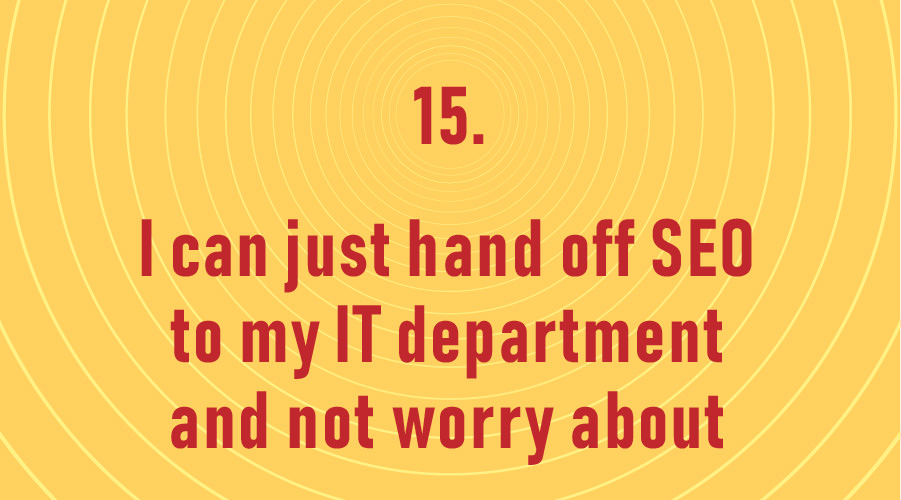
First of all, your IT department may not be the best people to handle your SEO efforts. Second of all, SEO is not something you can just hand off to someone else and not be involved at all. You do need to stay involved and understand at least the basics to ensure that your SEO strategy is aligned with your company’s overall objective and to make sure that the SEO campaigns that are being employed are effective.
On the first point, although some aspects of SEO might be technical and involve things like HTML code and other technical issues, an IT specialist or web designer may not be well-versed in all aspects that go into SEO. An IT specialist or programmer may be able to help you with issues like ensuring that your website can easily be crawled by the search engine robots and help with installing an XML sitemap and setting up redirects. However, when it comes to effectively heading your overall SEO strategy they may not be the best people to do that. The same is true with web designers. They may be able to help ensure that your site has clear navigation and loads fast but that doesn’t mean they are well-versed in handling all aspects of an effective SEO campaign.
If you need help with SEO, you are usually going to be much better off getting help from an SEO specialist than an IT or web design professional. For many companies it is more cost effective to hire an outside SEO firm that specialises in search engine optimisation than it is to try to attempt to have in-house staff handle these activities.
If you decide to hire an outside service it is critical to ensure that you find a reputable and experienced SEO firm that has a proven track record in helping its clients succeed. Be very wary of any service that guarantees fast results, or any results for that matter. There are no guarantees when it comes to search engine rankings. Also, tactics that focus on short term results can do more harm than good. These kinds of techniques can end up hurting your rankings and your website could even end up being penalized.
To find a reputable SEO firm, you can ask colleagues for recommendations. Also, be sure to ask for references and look for reviews online. Check out their website to ensure that the services they offer are a good fit for what you are trying to accomplish. Of course you will want to find out what rates they charge for their services, but a proven track record is the most important factor to look for.
Hiring professionals that specialise in SEO services can be a very wise decision. It allows you to focus on what you do best, which is to continue to grow your business and focus on the products or services that you offer. However, it is a good idea to become educated on the fundamentals of SEO and stay current with what the best practices are, rather than simply leaving absolutely everything up to outside consultants. It is your business after all, and you need to have a way to monitor the effectiveness of your company’s SEO campaigns and make sure they stay in alignment with your organisation’s overall objectives.
16. SEO Is A Scam
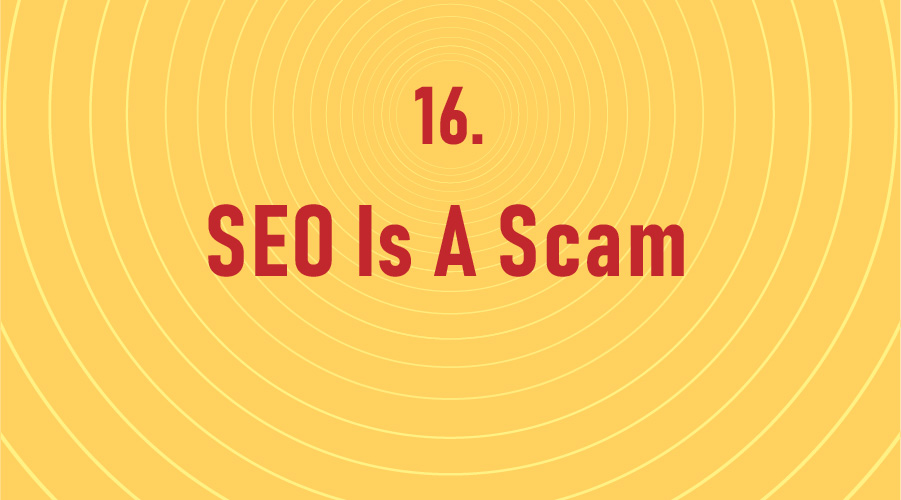
Many website owners have been burned in the past by either implementing ineffective and risky SEO methods themselves or from hiring dishonest or unqualified SEO services. This has led to poor results, and in some cases may have even resulted in their websites being penalised. However, this does not mean that SEO is a scam or that search engine optimisation is “dead.”
SEO is a continuously changing field and does require expertise to use it effectively. However, when done right the rewards can be great. A high ranking website can bring a steady stream of organic, targeted traffic to your website. This can result in high conversions on your lead and sales pages. Using SEO is can be one of the most cost-effective and profitable forms of marketing that you can use.
The key is to implement effective SEO strategies that are in alignment with your company’s goals and objectives. Most business owners are too busy running their companies to become SEO experts themselves. That is why it is often effective to hire SEO work to a reputable and experienced SEO firm, as discussed in the previous myth above.
SEO is only a scam when a dishonest practitioner tries to take advantage of you by using shady and/or ineffective tactics. However, SEO itself is not a scam. It has a long and proven track record for helping companies grow their businesses by sending lots of organic, targeted traffic to their websites. The tactics may change as the search engine algorithms change, but SEO can always be used effectively to help improve your site’s rankings.
Search engines want to find the most relevant and useful websites for their users. Therefore, if you follow the best practices of SEO, it can be used effectively to help grow your business.
Conclusion
As you can see, there are many SEO myths out there. In some cases it may be obvious that they are scams, but in other situations it can be difficult to know what is true and what isn’t. Sometimes even so-called SEO experts get caught up in some of these myths.
SEO is a constantly evolving field, and it is very important to keep up with the changes. Whether you plan to do your own SEO work or hire an outside consultant, it is essential to stay as up-to-date with the latest changes as you can in order to plan an effective strategy and ensure that your SEO efforts are cost-effective, safe and efficient.
SEO can be one of the most effective and practical ways to bring targeted traffic to your website. When done right, this can really help to grow your business. Just don’t get caught up in all of the SEO myths that tend to get thrown around. Stay informed!
![15 SEO Myths Uncovered – [2018 Version Updated]](https://www.etraffic.com.au/wp-content/themes/etraffic/assets/img/banners/banner_bg.png)
